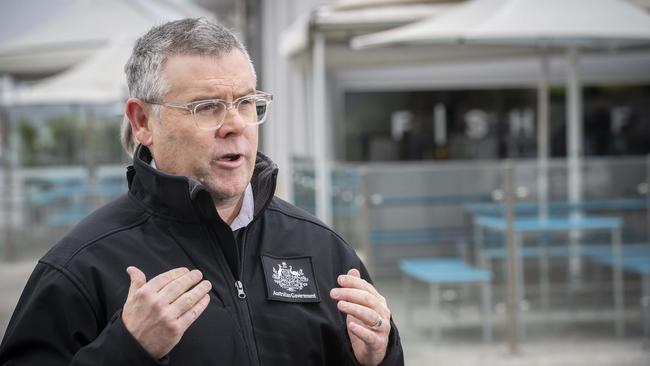Thousands arrive to resolve labour crisis
Overseas workers are flowing into the country under the Pacific Australia Labour Mobility scheme, with nearly 34,000 already here and another 40,000 pre-vetted and ready to go.

Overseas workers are flowing into the country under the Pacific Australia Labour Mobility scheme, with nearly 34,000 already here and another 40,000 pre-vetted and ready to go.
The latest figures from the Department of Employment and Workplace Relations show the number of workers entering the country has gathered pace, with an extra 2000 people arriving in the past six weeks.
Agriculture Minister Murray Watt will announce on Friday a further expansion of the scheme, enabling metropolitan businesses to hire workers in farming-related industries struggling with labour shortages.
The change will enable employers in select agricultural industries, including meat, seafood, fruit and vegetable processing, to access Pacific workers, as Senator Watt reiterated the government’s commitment to addressing workforce shortfalls in the sector.
“The government has already begun delivering on its commitment to expand and improve the Pacific Australia Labour Mobility scheme,” Senator Watt said.
“We know that there are some longstanding issues with the agriculture workforce that emerged over successive governments and they will take time to resolve.
“But it’s pleasing to see progress being made to deliver the workers industry needs and the protections those workers deserve.”
The Albanese government has signalled it prefers the strategically important Pacific worker scheme over the former Coalition government’s agricultural visa designed to plug labour shortfalls in the horticultural sector.
Senator Watt has pledged to honour Australia’s memorandum of understanding signed with Vietnam as part of the former government’s agricultural visa negotiations, but has ruled out resurrecting the scheme.
Labor’s election promise to scrap the Coalition’s agricultural visa in favour of a new agricultural stream within the existing PALM program was met with criticism from the Nationals and peak farming bodies, including the National Farmers Federation.
NFF chief executive Tony Mahar said members had been advocating for a specific agriculture visa for more than five years, and accused Labor of “turning its back” on a “chance to be part of a solution” for the workforce crisis.
The government has also promised to pay upfront travel costs of Pacific workers travelling to Australia and enable workers to bring their families with them, and deliver 13,000 new fee-free TAFE and vocational training places for agricultural workers.
Following a meeting between employer groups, unions and government as part of a new tripartite working group on Thursday, Senator Watt said members agreed to ensure workers were “treated fairly”.



To join the conversation, please log in. Don't have an account? Register
Join the conversation, you are commenting as Logout